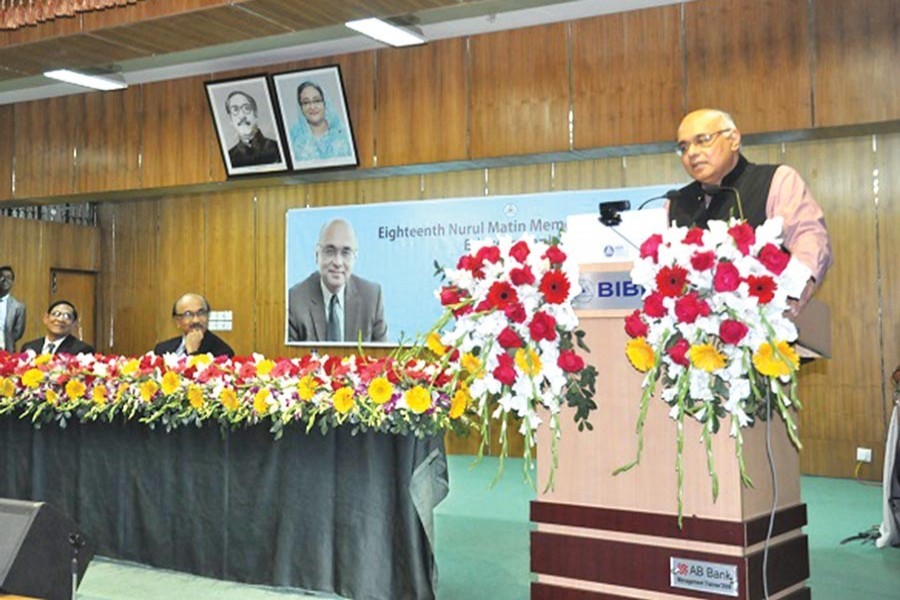‘Ethical politics prerequisite for ethical financial system’
A leading WB economist says at BIBM lecture

Published :
Updated :

Only an ethical political system can ensure an ethical banking and financial system, an eminent economist has said at a lecture in the city.
"A parliament that follows the principles of ethics is critical for the growth of an ethical banking system," said World Bank Country Director for India Dr Junaid Kamal Ahmad said while speaking on a lecture on 'Ethics in Banking' on Monday.
"If there is no ethical parliament, there cannot be an ethical financial or banking system," he said.
Bangladesh Institute of Bank Management (BIBM) organised the Nurul Matin Memorial Lecture at its campus.
Dr. Junaid Kamal Ahmad is a Bangladeshi national and first South Asian holding that post.
In his keynote speech, he said self regulation of any industry is very important.

"The risk of not having self regulation is: if industries don't do it, ethics will hit you back and you will find yourself in a tremendously controlled and regulated situation."
Dr. Ahmad voiced the necessity of strengthening the independence and capacity of the central bank for safeguarding the banking system.
He laid emphasis on the importance of ethics in the financial system and termed it critical for earning trust of the public in the banking system.
However, Dr. Ahmad stressed that the principle of ethics could not easily offer the organising principles for any design and development of the financial system.
He said a clear separation of well-defined roles and an independent and strong central bank are required most for establishing an ethical financial system.
He said the government should not control the interest rate in a market economy.
"No government will give up the ability of controlling pricing, because price is the important powerful political tool globally," he said.
Setting only the technocratic perspective to manage the banking system in the context where political economy and public policy of the financial sector are linked would not offer a sustainable platform for addressing the challenges of a banking system, Dr. Ahmad added.
"Ethics offer us a way to look at the connection of the political economy, public policy and banking system if we are ready to ask the critical question how to bring ethics to the forefront in the functioning of the parliamentary system," he added.
He said the parliamentary committee on the banking and finance should function based on the ethical principles to protect the citizens and ensure a transparent and competitive financial sector.
He said the public policy could focus fundamentally on creating a competitive and transparent banking and financial sector and concentrating on a transparent and competitive banking sector.
He urged policymakers not to overburden the financial system with the job of doing something that is actually the job of the political system.
"Do not overburden the banking system with SME, green banking or women's lending. The banking will collapse," he maintained.
He said the backdoor policy implementation of SME, green banking or other directives actually leads to directed credit.
"If you want to do SME, green banking or women's lending, there is one place to do it. Debate it at parliament, reflect it in the fiscal budget and let it be visible on the government platform."
"Do not use banking sector to do these, because the government taxes the banking sector," he said.
The central bank could play a role of creating a system rather than policing if something was wrong, influence the parliamentary machinery and bring citizens' watchdogs or ombudsmen to oversee the financial sector, he observed.
He said the Islamic banking is based on the notion that banks have to provide equity and share the profit and loss. That's the ethical way of doing business, he added.
He said, "We need institutions that can initiate dialogues among parliamentarians, citizens, academia and civil society members".
Speaking at the programme, Bangladesh Bank (BB) Governor Fazle Kabir said, "In relation to ethics in banking, we must accept that banking has been perceived from its inception as a business which largely depends on mutual trust and personal integrity."
He said banks deal with countless depositors and borrowers whose interest, if threatened, will bring the economy to a halt.
Dr. Junaid Kamal Ahmad holds a PhD in Applied Economics from Stanford University. He is an MPA from Harvard University and a BA from Brown University.
The philosophy, strategy and contribution of Dr. Ahmad are held in high esteem by many policymakers in the international arena.
bdsmile@gmail.com


 For all latest news, follow The Financial Express Google News channel.
For all latest news, follow The Financial Express Google News channel.